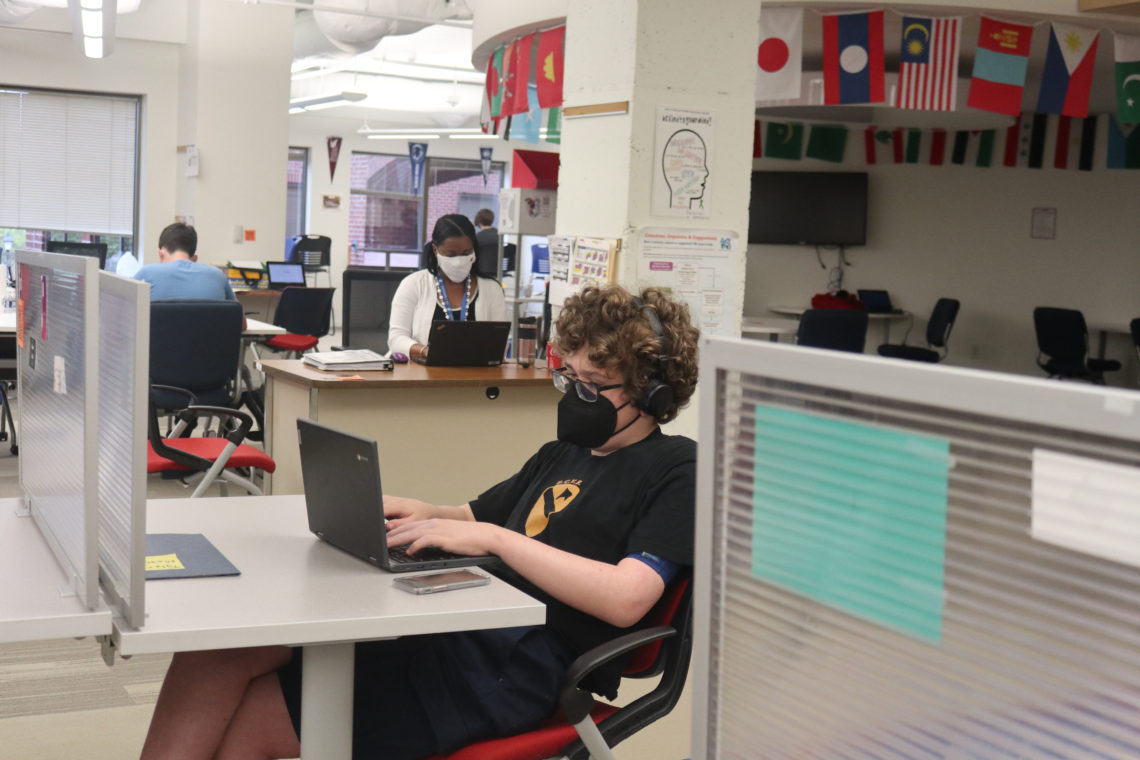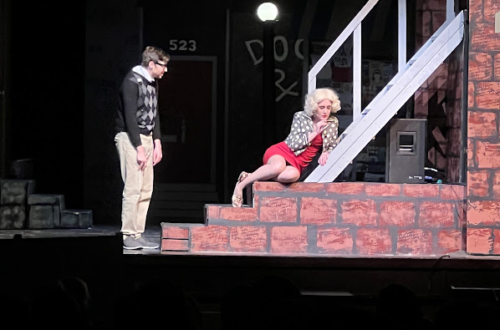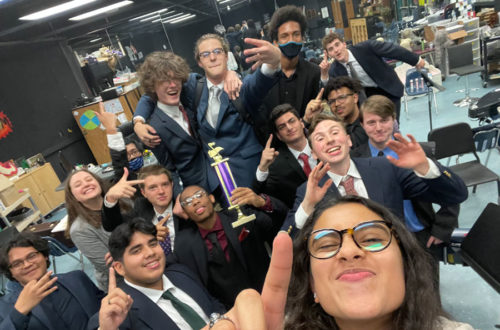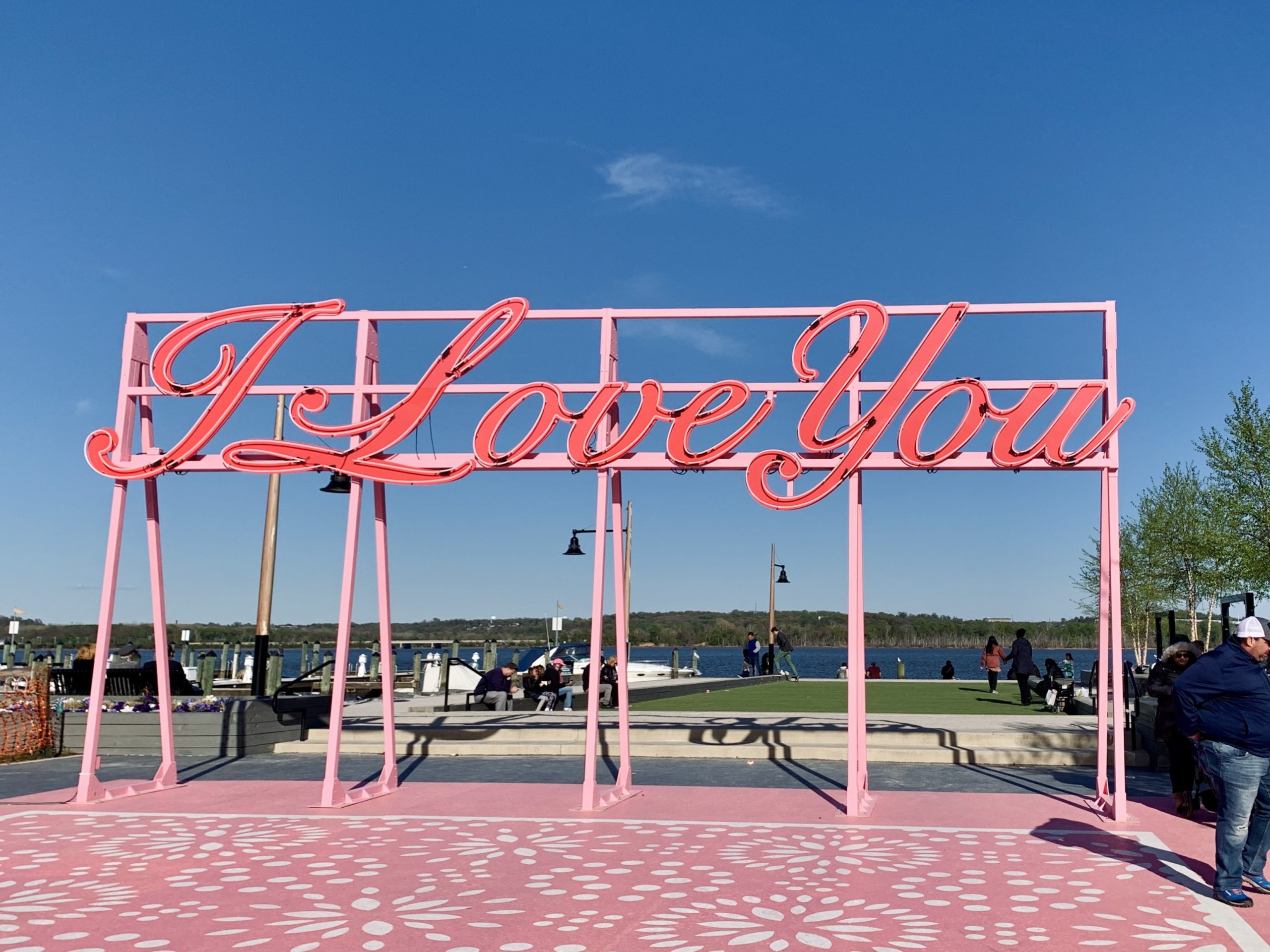Often overlooked, Satellite Campus creates an adaptable, open learning environment where students take classes online but work alongside teachers and students.
Chloe Yokitis
Editor
ACHS’s bright, quiet Satellite Campus is one of four campuses that collectively make up ACPS’s only high school. Focused on creating a flexible atmosphere with online learning, many students who want a calmer, one-on-one approach to education choose Satellite, often because they work, have anxiety, are professional athletes, or simply prefer the smaller environment.
All four ACHS campuses— King Street (main campus), Minnie Howard, Chance for Change, and Satellite— are considered one large Connected High School Network. This means that they are made up of physically separate buildings located in Alexandria but are all a part of ACHS.
“It’s almost [like], ‘out of sight, out of mind.’” said Ms. Fredericka Smith, Satellite’s campus administrator, or principal. “Satellite is probably the least known campus, out of the four.”
The campus, located just under a 10-minute drive from the King Street Campus, resides on the second floor of ACPS’s Central Office building on Braddock Place. Though students primarily take their classes online through online services such as Edgenuity and Florida Virtual Learning, they are required to spend at least four hours working a day— part of which must be completed from Satellite’s physical campus.
Walking out of elevators on the second floor (or stairs, if you’re a student here— elevators are reserved for staff and visitors), bright LED lights and a table with flowers greets you before revealing an open hub of desks where students can spend time independently working.
“It’s not [like a normal] classroom where you’re in a closed space, and the desks are in a line. It almost gives you that Google space [vibe] at their headquarters, which is really open, and you can just come in and sit wherever you want,” said Ms. Smith. “It’s a very open and inviting space. We want it to be that way, so it doesn’t feel so restrictive or so rigid.”
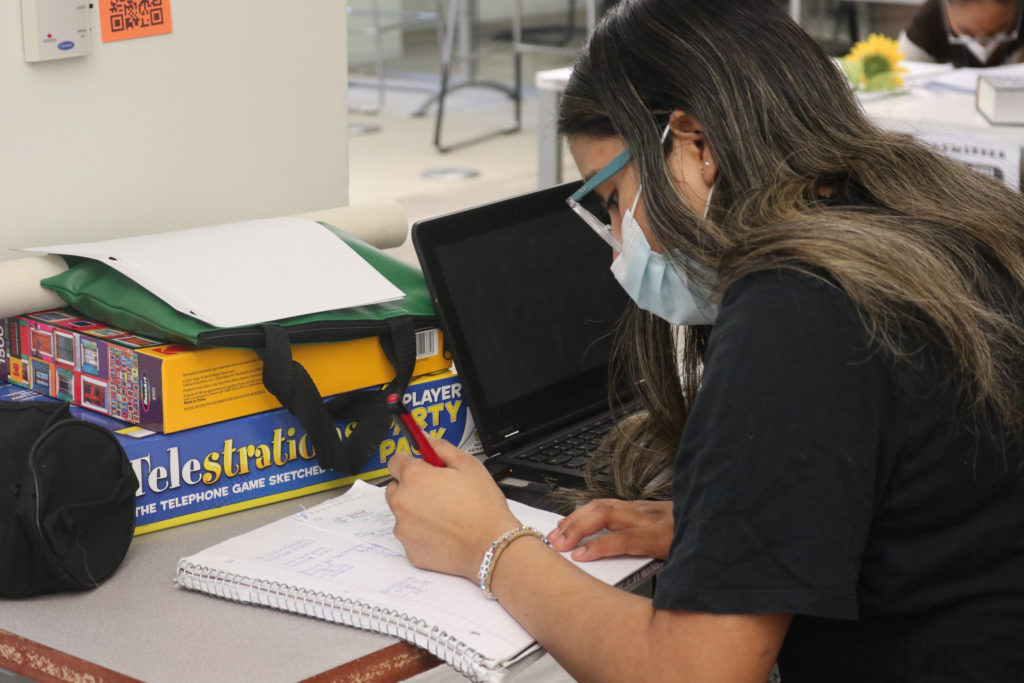
Satellite Campus, which has been a part of ACPS since 2012, started when a central office employee proposed the idea after she and her son found the need for a quieter school environment and more one-on-one time with teachers, according to Ms. Sheree Stephens, Satellite’s Administrative Assistant who has worked at Satellite since it began— making her its longest-running staff member.
“It just took off from there,” she said.
Now boasting around a hundred students most years, Satellite also has six in-person teachers who cover core subjects like math, social studies, English, and electives. On top of students’ assigned online teachers who are associated with the online platform, Satellite teachers are in-person resources for students. They assist students with specific questions and hold regularly-scheduled blended learning sessions with students as a way to make sure that they have everything they need for their online classes. Besides acting as teachers, they also are counselors and advisors.
“[Students have] senior advisement meetings when you do your check-ins with your advisor. All of the teachers are advisors, so they’re not just teachers,” Ms. Stephens said. “Each teacher has an advisory caseload. Say you started at Satellite, and you’d be assigned to one of these teachers who would be your check-point person.”
As advisors, they keep on top of your schoolwork to make sure you’re in a good place for finishing your class, take attendance, and serve as the bridge between students, parents, and Satellite administration, even if you don’t take the class that they teach.
“We help them deal with the realities of being a teenager, and then there’s, of course, the academic side,” said social studies teacher Mr. Simon Guggenheim.
Many teachers try to focus on a one-on-one approach with their students to make sure that they support everyone.
“Personally, I just like being able to do more individualized work. Not that I don’t love the [average] classroom, but if people needed more support, I feel like this is a great way to get the support that you need here,” said Ms. Kimberly Giles, a teacher at Satellite. Giles teaches at both the King Street Campus and Satellite, depending on whether it’s a Red or Blue day.
At Satellite, students say they have strong connections with their teachers because of their personalized relationships.
“The teachers are really nice and really look out for you. And, of course, the King Street teachers are too, but they have so many students, so it’s hard for them to keep up with you the same way they do here,” said Darcy Setliff. Setliff is a junior who has been at Satellite for a month after previously attending the King Street campus as well as a non-ACPS boarding school.
Due to Satellite’s small size, the community has a comforting, small-town feel amongst all staff and students. Teachers and staff, such as the principal, have open-door policies to create an open environment that encourages a sense of family.
“When we have a lot of people here, and the energy’s good, the community feel can be excellent because it’s small enough that everybody— literally everybody— knows everybody,” said Mr. Guggenheim.
Even though students take classes independently online, they still form friendships with each other.
“Making friends here is actually not as bad as I thought it would be. When I first came here, I was a little shy, obviously because of COVID, so I haven’t been talking to people that much. But I’ve met some really nice people here,” said junior Isaiah Robinson.
Outside of the Satellite campus, students also have the option of taking classes at the King Street campus. Here, Satellite students often take electives that are not online, or classes such as math or APs that they prefer to take in-person in a typical classroom setting.
“It gave me the opportunity to take a couple classes at King Street that I might not be comfortable taking here, or aren’t possible to take here,” said sophomore Duncan McCall. “I take Band and Spanish there.”
Many Satellite students are people with anxiety, jobs, many sports practices, or wish to graduate early, though each student has different reasons for attending. Sophia Chapman, a senior and President of Satellite’s Student Government Association, chooses to attend Satellite for health reasons.
“I have health issues that were making it hard to have the schedule that I had at King Street, and here, there was more flexibility,” said Chapman.
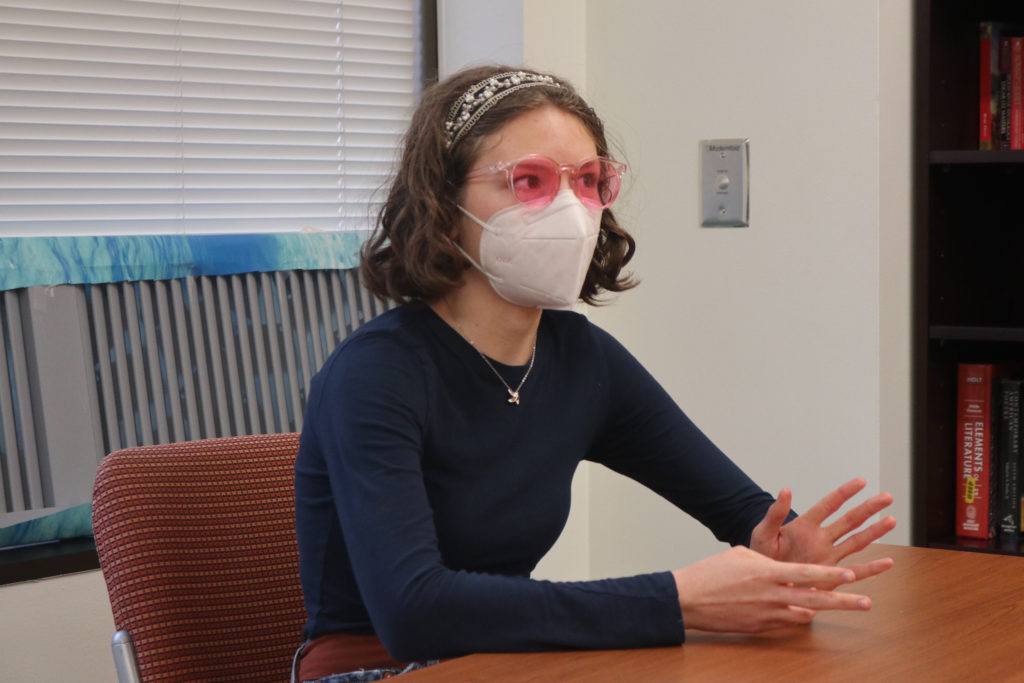
Returning from 2020-2021’s year of virtual learning, there has been an increase in people choosing to come to Satellite for health reasons— namely, because of COVID-19.
“Once we came back, enrollment picked up really quickly because we had a lot of students who weren’t quite ready to go back to the building. Coming here, we offer smaller spaces, a little bit more [of] six feet distance, [which offers] a little bit more security for students and parents to stay COVID-free,” said Ms. Stephens.
Apart from health reasons, many students choose Satellite because of its smaller size, especially compared with the bustling, constantly-moving King Street Campus.
“The environment there, I don’t like it. It’s too many people, so much going on, [and] I just like to be here. It’s better,” said Jailyn Bethea, a junior who has attended Satellite for a year.
Though most of Satellite’s students are seniors, rising ninth graders or any students already at ACHS can apply for Satellite with the help of their counselor.
“So, you would just go to your counselor and say, ‘I’m interested in attending Satellite,’ and they would fill out the application,” said Ms. Smith.
After that, students submit a brief, 250-word essay about why they want to attend Satellite. Once Satellite receives their application, the student, their parent or guardian, their counselor, and their academy administrator meet with Ms. Smith as well as other Satellite staff members for a panel meeting to discuss the application before Satellite administration makes the final call to admit the student.
“A counselor [or] an administrator can tell me a whole lot of stuff about a student, but I want student voice in the process. I want to hear what’s going on in their lives [and] why they’re choosing to come to Satellite,” said Ms. Smith. “Nine times out of ten, students are accepted into Satellite. It’s very rare that we say ‘No’ to a student application.”
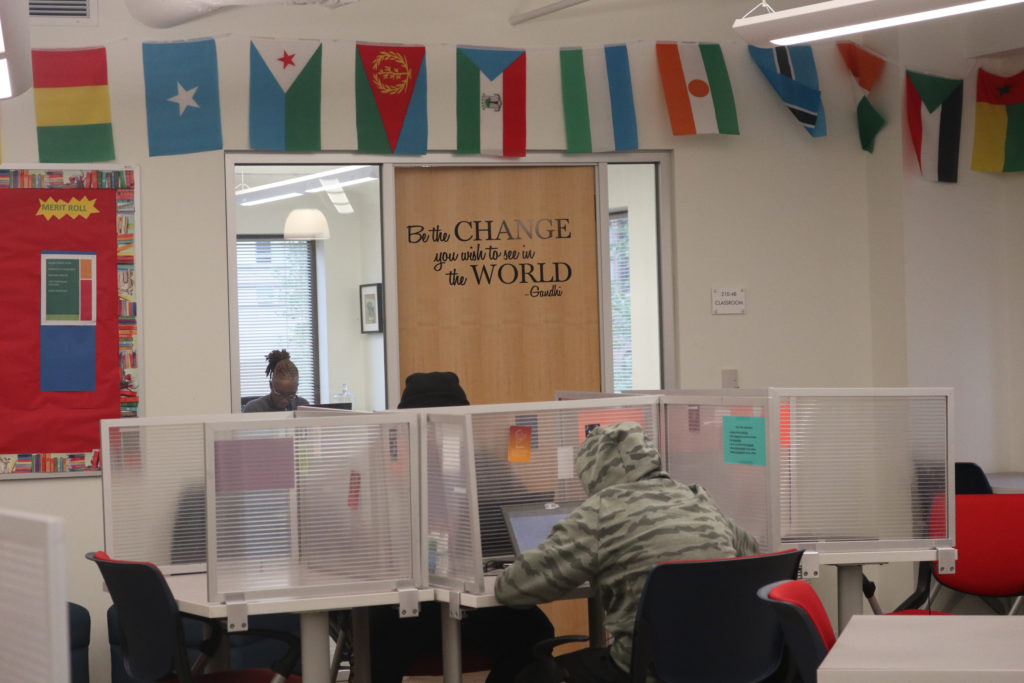
In the future, Satellite is looking to expand its enrollment.
“Right now, we have 80 students. On average, it can be up to 100 students a year. The goal is to get [enrollment] up to between 200-400 students over the next few years as part of the High School Project,” said Ms. Smith.
However, Smith wishes to maintain the warm, cozy feel that Satellite has.
“I don’t want to lose that essence of who we are, because we are family. We celebrate each other. We’re here for each other,” she said. “I want to be able to maintain that essence of who we are as a campus and as a Satellite community, while still working to expose more students to the option of Satellite as part of their graduation options.”
Featured photo by Hanafia Arsad
This article is part of a three part series about Satellite Campus. To view the other two articles, click below:

